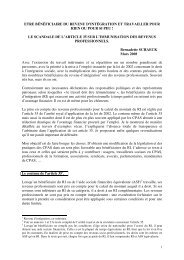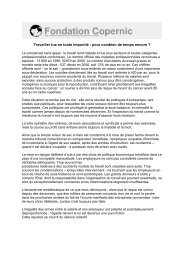Awra Amba RJ 300612 EN - Contacter un comité local d'Attac
Awra Amba RJ 300612 EN - Contacter un comité local d'Attac
Awra Amba RJ 300612 EN - Contacter un comité local d'Attac
You also want an ePaper? Increase the reach of your titles
YUMPU automatically turns print PDFs into web optimized ePapers that Google loves.
6. External relations<br />
The relations are day-to-day relations with neighbouring comm<strong>un</strong>ities, either through school students<br />
or through neighbours, clients of the café, the shop or the mill. Relations with Ethiopians living far<br />
away are conducted on the one hand through the administrative and trade relations within the<br />
Amhara region, on the other hand through the activist exchanges, either the participation of Zumra or<br />
other <strong>Awra</strong> <strong>Amba</strong> members to radio and television broadcasts, or conferences in different public<br />
structures, or through the visit in the village of very many isolated people and above all of groups.<br />
<strong>Awra</strong> <strong>Amba</strong> received so 1700 visitors from 2003 to May 2005 (At05/7), 1300 visitors more <strong>un</strong>til the<br />
end of 2007 (Ya08/141), and 6000 in 2009 (Jo10b/10), which would be considerably greater than<br />
during the former years: it is probably 6000 visitors <strong>un</strong>til 2009, i.e. 3000 since the end of 2007<br />
(Question 38 in Annex). These figures are quite considerable for a small village. Among these<br />
visitors, some foreigners, either tourists, or working in Ethiopia or journalists.<br />
6.1. Relations with neighbouring comm<strong>un</strong>ities<br />
The women of the village rarely wear traditional clothes, <strong>un</strong>like women of the neighbouring villages:<br />
it shows without doubt a refusal to accept the traditional customs, as well as the distance of<br />
comm<strong>un</strong>ity members with the behaviours of their neighbours. <strong>Awra</strong> <strong>Amba</strong> is perceived by its<br />
neighbours as a deviant, suspicious, secret, cruel, lazy and pagan caste (At05/66):<br />
- Deviant and suspicious, because it has definitely a culture and behaviours very different from the<br />
traditional Amhara society: this assessment is mainly supported by neighbouring Muslims and by<br />
old Orthodox Christians;<br />
- Secret, because its members do not mix with their neighbours, as detailed below;<br />
- Cruel, because they do not go with the relatives of the deceased during f<strong>un</strong>erals (see section 4.6)<br />
and are not crying and wailing after the death of a relative;<br />
- The use of the term lazy is connected to the infringement by men of the traditional sharing of<br />
duties: they are not without doubt real men. This assessment is nevertheless not general, since<br />
many others characterize them as hard working, especially the Orthodox neighbours and the<br />
relatively poor neighbours (At05/66 & 71);<br />
- Pagan, because the comm<strong>un</strong>ity does not respect any of the religious Muslim or Orthodox rites.<br />
The lack of religion and above all of respect of religious rites raises obviously a serious problem for<br />
the members of neighbouring comm<strong>un</strong>ities, for which their observance is essential (Yi07/66-68 &<br />
77). For Me09/74, it is the f<strong>un</strong>damental reason, which leads to distrust for any innovation coming<br />
from <strong>Awra</strong> <strong>Amba</strong>. It could explain that the Muslim neighbours are more severe with the comm<strong>un</strong>ity<br />
members than the Orthodox neighbours, most of the inhabitants of the village having a Muslim<br />
backgro<strong>un</strong>d and having in some way recanted their faith. But in addition, it makes difficult the<br />
relations between children from <strong>Awra</strong> <strong>Amba</strong> and children from other comm<strong>un</strong>ities in the shared<br />
school: during their games, how to play with children, who are <strong>un</strong>able swearing by God that such a<br />
thing or such a word is exact? How to play with children who have no religion?<br />
The assessment of the neighbours is therefore strongly negative. It was built over the history of<br />
creation of <strong>Awra</strong> <strong>Amba</strong>, characterized by the hostility of neighbours for reasons of culture and land<br />
sharing. The stabilisation of the comm<strong>un</strong>ity, its success, its external recognition, the daily contact of<br />
its members have probably mitigated this ostracism, as reported by Yi07/62: the cross-cultural<br />
relationships seem better when compared with previous years (Yi09/92), religion and f<strong>un</strong>erals<br />
remaining the black spots (Yi07/63). The media and political success of <strong>Awra</strong> <strong>Amba</strong> fuels obviously<br />
71 /85

















